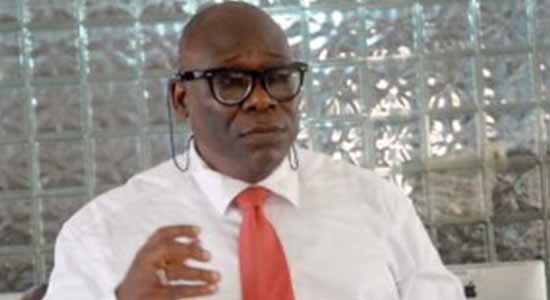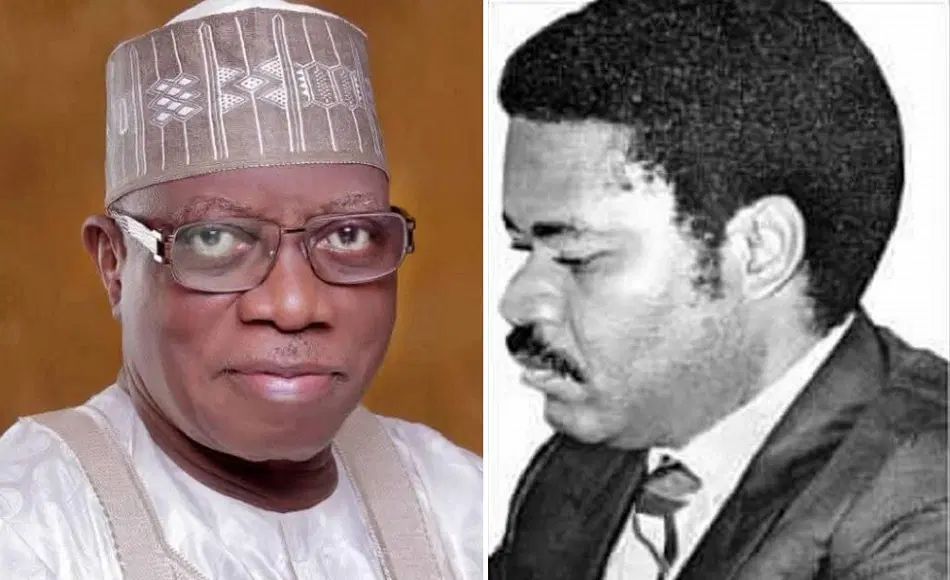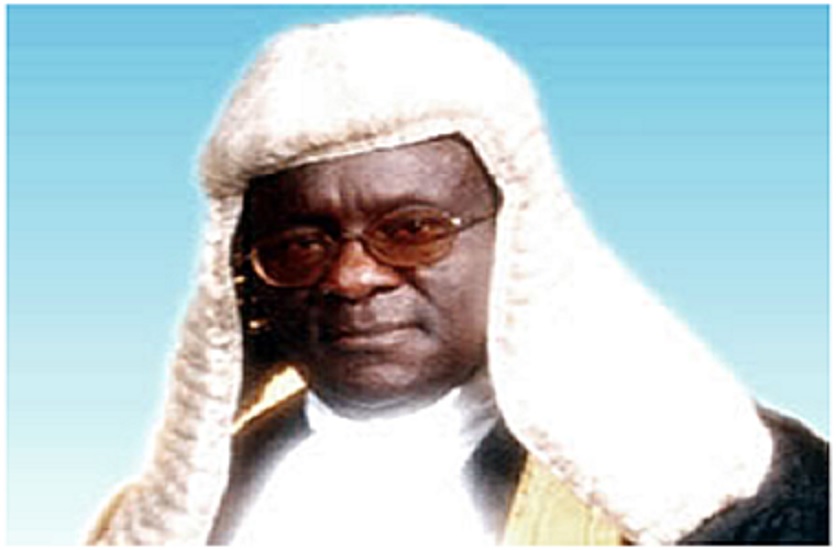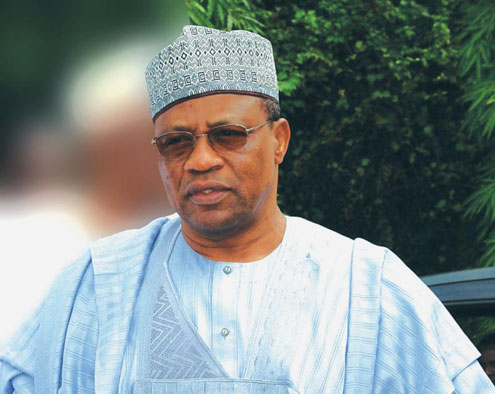By
Richard Akinnola

Today, Friday, September 5, marks the 16th anniversary of the death of Chief Gani Fawehinmi. There is no better way to honor Gani on this day than to rebut the lies peddled against him by Mr. Yakubu Mohammed, a director of Newswatch.

The first question that struck me was: What would Gani have done in the present circumstance? My answer: He would have written a book to counter Mr. Mohammed, just as he did with his erstwhile friend, Dr. Olu Onagoruwa, who lied about him in a book after leaving office as Abacha’s Attorney-General. Gani responded with a counter-book titled The Lies and Lies of Dr. Olu Onagoruwa.
So, in this present circumstance, this is my tentative response, which may eventually develop into a book due to some annexures that cannot fit into this space.
Mr. Yakubu Mohammed was one of the co-founders of Newswatch, in which Dele Giwa served as the founding Editor-in-Chief. He recently turned 75 and published his memoir. Understandably, the book touches on the assassination of Dele Giwa on October 19, 1986.
I have read the book, which I bought for N30,000 at RovingHeight, particularly Chapter 17—Assassination of Dele Giwa—and a follow-up interview with The Niche newspaper. There is little in the book on the Giwa assassination, but the issue of Glory Okon and Mohammed’s tirade against Gani in his Niche interview stands out. He claimed Newswatch was neither investigating nor working on any Glory Okon story, describing it as fictional.
In both the book and interview, Mohammed exculpated General Ibrahim Babangida from Giwa’s assassination. At the same time, he harshly criticized Gani Fawehinmi, who had staked his life on seeking justice for the slain journalist. I have no issue with Mohammed’s opinion that the Babangida junta did not kill his colleague—but it is uncharitable to lampoon Gani Fawehinmi, someone who risked everything in pursuit of justice for Mr. Mohammed’s colleague. By my records, this trajectory involved 38 cases and 214 court appearances.
On pages 236–237 of the book, instead of naming Gani Fawehinmi directly, he wrote:
“During the Giwa tragedy, some people who might have rubbed the Babangida administration the wrong way were ready to swear that nobody but Babangida could have killed Dele Giwa. Such people, including assorted social critics and human rights activists, could not have numbered among his fans, and they did not fail to show it. Though many patriots who felt genuinely touched by the tragedy made commendable and altruistic efforts to pressure the investigating agencies, the few who had axes to grind went too far in my view. In many instances, they invented their own stories and helped reshape the narratives, resorting in the process to blatant fallacies and unhelpful conjectures. The methods they adopted narrowed the investigation to a few options instead of widening them…designed to produce a predetermined outcome. It was as a result of this that the board of Newswatch Communications felt the urgent need to put a disclaimer to the angle pursued by Gani Fawehinmi, which was decidedly narrow.”
Some of Mohammed’s statements in the Niche interview include:
“Gani Fawehinmi was not the Newswatch lawyer. Dele Awokoya, who used to be in his chambers, was our lawyer. I am not disowning him, but he was not our lawyer. Gani had passion for big cases, and we were attracting big cases, so he was interested. When he came to defend us against Chief Rotimi Williams, we didn’t invite him. But because he had his own grouse against Rotimi Williams, he took over, and we thanked him for that. Dele wrote him a letter after his encounter with the SSS, but he was not Newswatch’s lawyer…”

“The people Gani accused of killing Dele went to court, all the way to the Supreme Court. My conjecture all along is that Dele’s assassination had nothing to do with Newswatch because if it did, they should have come to our office and bombed us during our editorial conference. Billy, who brought it to his father, made a statement, and someone sitting there said, ‘Billy, state that this parcel was from Babangida…’”
Let me first address Mohammed’s erroneous claim that those Gani accused fought the matter all the way to the Supreme Court. The correct trajectory is as follows:
After a series of legal battles over his right to act as a private prosecutor, Gani’s appeal reached the Supreme Court. On Friday, December 18, 1987, in a unanimous decision by seven justices, the Court upheld Gani Fawehinmi’s right to privately prosecute the two security chiefs he believed were responsible for Giwa’s murder.
Pursuant to this judgment, Gani applied at the Lagos High Court for a Mandamus order compelling the State’s DPP to prosecute the two security chiefs, or allow him to do so. Justice Olusola Thomas, on Thursday, January 21, 1988, ordered:
“I hereby order that Mr. J.A. Oduneye, the former Director of Public Prosecutions, exercise his discretion whether or not to prosecute Col. Halilu Akilu and Lt-Col. A.K. Togun for the murder of late Dele Giwa. If he declines, he shall endorse a certificate to that effect on the information submitted to him on Monday, November 3, 1986. This order shall be carried out on or before Monday, January 25, 1988.”
Following this, Gani sent the court ruling to the DPP. The Solicitor-General confirmed that the State was ready to prosecute the suspects. The murder information was filed before Justice Eniola Longe in The State v. Col. Halilu Akilu and Lt. Col. Kunle Togun (Charge no. ID/4c/88). The prosecutor was Mrs. Eniola Fadayomi, while Chief Rotimi Williams, SAN, represented the accused, who were not in court. Williams raised a preliminary objection, which was agreed to by the prosecutor, and the charges were eventually quashed.
Gani stated that had he been granted the fiat to prosecute, he would have called Babangida to the witness box: “I have 420 questions for Babangida. Let him answer them, and then we will know who killed Dele Giwa.”

After the court discharged Akilu and Togun, they filed defamation suits against Gani, winning N6 million (N3 million each). Gani appealed, and the Court of Appeal overturned the decision, rebuking the High Court judge. The case ended there (Nigeria Weekly Law Reports, 1994, 6 N.W.L.R Part 351).
Mohammed accused Fawehinmi of falsely blaming the Babangida regime. He also claimed the Gloria Okon investigation was never Newswatch’s concern. While Mohammed is entitled to his narrative, the Gloria Okon angle originated from information filed in court by Gani Fawehinmi and had to be reported.
Gani Fawehinmi died 16 years ago. For almost 20 years prior, Mohammed did not confront him. It took 16 years after Gani’s death for Mohammed to claim Fawehinmi lied about the Babangida government.
I have no evidence that Akilu, Togun, or Babangida killed Dele Giwa, but such a parcel-bomb assassination in 1986 would have required a sophisticated security network. Dele had expressed fears to Gani two days prior, and his widow Funmi noted that a hired shooter could have sufficed, but the perpetrators used a parcel bomb—a novel method in Nigeria at the time.
While Mohammed may defend Babangida, I have these questions for him:
Why didn’t he confront Gani Fawehinmi while he was alive?
Why didn’t he contradict Mr. Ray Ekpu at the Oputa Panel, particularly regarding six questions Babangida’s security chiefs refused to answer?
Why didn’t he counter Major Debo Bashorun, former aide to Babangida, who in Honour for Sale (2013) accused the regime of orchestrating Giwa’s murder?
Why didn’t he challenge late CP Abubakar Tsav, the first investigator assigned to Giwa’s murder, whose preliminary report implicated the Babangida regime?
Why didn’t he counter Mr. Ray Ekpu’s evidence regarding Gloria Okon?
For reference, here is what Ray Ekpu said at the Oputa Panel:
“What was the result of the police investigation? Akilu had told Funmi that he wanted to inform Giwa about a message from the ADC. Based on this, he got a thorough description of how to reach Giwa’s house. Dele Giwa was denied the right to life. The seeming helplessness of the police regarding the security officials in Giwa’s last four days, and the government’s inexplicable stand on an open judicial inquiry, fueled speculations of a deliberate cover-up. Up till today, the following questions remain unanswered:
Why was Akilu interested in Giwa’s home address that weekend?
Why did Akilu not phone him in the office on weekdays, given they were not friends?
Does he need a home address to inform Giwa that the matter was settled?
Why did he not inform Giwa of the reason for requesting the home address?
Was the gun-running allegation a cover so that if Giwa died, it would be said that it was the arms he allegedly imported that exploded?
How did the parcel bomb arrive in Nigeria—or was it locally manufactured?”
THE GLORIA OKON ANGLE
In the course of his cross-examination at the Oputa panel, following his evidence, counsel Dele Awokoya asked Mr. Ray Ekpu:
Awokoya: “Now, there was this Gloria Okon angle to the matter. Can you please explain to the Commission that angle?”
Ekpu: “Yes, there was a lady called Gloria Okon, who was arrested in Kano for alleged drug smuggling. She was detained in a prison in Kano and, after some days—I cannot remember the exact number—she was said to have died in detention. There were all kinds of allegations and speculations about whether she actually died in custody or was spirited out of the country. Newswatch was working on a story about Gloria Okon, but at the point that Dele died, the story was still just an idea on our register of stories to be investigated. Several reporters were to be assigned to it. It was at this point that Dele died.”
The cross-examination of Chief Gani Fawehinmi by Mrs. Nwandu, the Commission’s counsel:
Mrs. Nwandu: “Chief Fawehinmi, just a couple of questions for you.”
Fawehinmi: “Yes, ma.”
Q: “Your petition speaks volumes about your single-minded devotion to the cause of our fallen friend. We commend your investigative effort. Just a few questions: You mentioned the name of Gloria Okon during your testimony in person, but you did not elaborate. Could you tell the Commission?”
A: “Thank you very much indeed. I am happy that the Editor-in-Chief of Newswatch, Ray Ekpu, had told the Commission that the issue of Gloria Okon was being worked on by Newswatch at that time. Dele Giwa was not in the country; he was abroad gathering information on Gloria Okon.
“The meeting of October 9, held by the Chief Executives of the Newspapers with Haliru Akilu and Togun, was to the effect that any member of a newspaper publishing or possessing information affecting the wife of the President or the President himself must clear it with the security. Gloria Okon was a courier for Mrs. Maryam Babangida.”
Q: “Courier for what, Chief?”
A: “Courier for drugs, and it was published in some papers. Gloria Okon was arrested for carrying drugs. When she spoke and revealed the name of the wife of President Babangida, she was promptly taken elsewhere, and the information was that she was murdered during Buhari’s regime.”
Q: “Chief, just a moment.”
A: “The government set up…”
Q: “Excuse me, I am sorry.”
A: “The government of Buhari set up an investigation.”
Chairman: “He is giving you the connection.’
Fawehinmi: “Yes, Sir. He set up a panel, which is crucial. Before the panel could submit its report, on August 27, 1985, Buhari had been toppled and Babangida came to power. The report was submitted to Babangida, who refused to release it to the public, and to this day, it has never been released. They thought Dele Giwa had obtained all the information, and Mr. Togun said on October 27, 1986, at the airport, that when they reached an agreement on certain matters, no one should try to publish it. That matter was Gloria Okon.”
Q: “Chief, before Dele Giwa’s death, you said he was investigating Gloria Okon. Is that correct?”
A: “He was genuinely investigating Gloria Okon, there is no doubt about that. But they did not want him to pursue it.”
Q: “Was he able to confide in you, did he tell you the outcome before he died?”
A: “Ray Ekpu already mentioned that the story was on their register. But before they could finish, Dele had died. What else do you want me to say?”
These are not my words; they are extracts from the Oputa panel proceedings, which recommended that the investigation into Dele Giwa’s murder be re-opened.
Due to public curiosity regarding the Gloria Okon angle, as a journalist with Vanguard, I interviewed Prince Bola Ajibola, Attorney-General in Babangida’s government, about Gloria Okon and the purported report on her death. Prince Ajibola said he would call for the report. The story was the lead in Sunday Vanguard on January 18, 1987, under the headline: Gloria Okon: Ajibola to Call for Report. This interview, Ajibola later told me, nearly put him in trouble with the government. I won’t divulge confidential details, but that’s all I knew about the matter.
I do not know whether Gloria Okon is fictional or real.
I would have expected Mr. Mohammed to align himself with the Oputa panel’s recommendations to re-investigate the murder, instead of engaging in a red herring—lampooning Gani Fawehinmi, who put his life and resources on the line seeking justice for Dele Giwa.
Assuming, without conceding, that Gani was wrong, what alternative leads has Mr. Mohammed proffered, apart from exonerating Babangida?
Mr. Mohammed also falsely claimed in his Niche interview that Gani told Billy Giwa, Dele Giwa’s son, to accuse Babangida of the murder. This is a blatant lie: Billy’s statement merely recounted what transpired between his father and Akilu a few days before the assassination and how he received the parcel from a security officer. I will publish the full text of Billy’s statement later. How Mr. Mohammed seeks to exonerate Babangida while simultaneously throwing Gani under the bus is intriguing—and cowardly, coming 16 years after Gani’s death.
In his Niche interview, Mr. Mohammed also accused Gani of being an ethnic chauvinist in an attempt to defend Babangida. This is an odious fallacy. The first case that brought Gani to national attention, in 1969, involved a northerner, Bala Abashe, who alleged that the Secretary to Government of Benue-Plateau State, Andrew Obeya, had allegedly taken his wife. That earned Gani his first detention—when his first son, Mohammed, was born. To claim that Gani accused Mr. Mohammed of supporting Babangida because he was a northerner is perverse, to say the least.
Mr. Mohammed further lied by claiming Gani was never Newswatch’s lawyer. This is perversely disingenuous. Dele Awokoya, who worked in Gani’s chambers, did serve as Newswatch’s lawyer in some cases, but Gani also intervened, pro bono, when necessary. For instance, when Dele Giwa approached Gani over a letter from Rotimi Williams demanding a retraction and apology, Gani handled the matter on behalf of Newswatch. I was present when Giwa briefed Gani; I witnessed the interactions.
How, then, can Mr. Mohammed claim that Gani “hijacked” the case due to a personal score with Williams? That is a blatant lie and a grossly unfair accusation against a man who cannot defend himself. Gani’s interventions were professional, not personal.
Gani’s legal battles with Williams and others, such as in Gani Fawehinmi v. Legal Practitioners Disciplinary Committee and Gani Fawehinmi v. NBA, were professional contests, highlighting his dedication to justice. When Williams sued Newswatch, Gani’s defense argued that Williams had no reputation to claim, citing a 1949 case where Justice Abbot upbraided Williams for professional misconduct.
If Gani went to such lengths to defend a client, how can Mr. Mohammed claim he was never Newswatch’s lawyer? Moreover, Gani formally withdrew as Newswatch lawyer after Giwa’s murder. Can one withdraw from a client if never briefed? Why did Mr. Mohammed remain silent then—and why speak 16 years after Gani’s death? This is cowardice.
In 1987, Newswatch was proscribed by the Babangida government under Decree No. 6 of 1987. Through Gani, Dr. Olu Onagoruwa challenged the proscription while Gani served as his lawyer. Yet, the same man who fought your magazine’s proscription is now being thrown under the bus. Would one be wrong to say this is “the hand of Esau and the voice of Jacob”?
Mr. Mohammed claimed Giwa’s murder had nothing to do with Newswatch, reasoning that if it did, the perpetrators would have bombed Newswatch during editorial meetings. This is a jejune statement. Are we to believe the Abacha strike force that targeted Alex Ibru or Sgt. Rogers targeting Kudirat Abiola should have struck these journalists only in their offices to prove the point?
Dear Mr. Mohammed, feel free to defend your friend Babangida—but it is cowardly to throw Gani Fawehinmi under the bus 16 years after his death, thereby spitting on Dele Giwa’s grave 39 years after his murder.
This is the same Babangida who, on three occasions, stated that the only genuine critic he respected was Gani Fawehinmi. In Tell Magazine, July 24, 1995, Babangida said:
“If there is one man I respect, it is Gani. It sounds strange. I appreciate that you have a strong conviction and fight for it consistently. He was a dogged fighter, and I respect him for this. In fact, there are three of them I respect like that: Gani, late Professor Awojobi, and Dr. Yusuf Bala Usman. None says anything without doing his homework first.”
If Mr. Mohammed claims that Giwa’s murder had nothing to do with Newswatch, does he have information the public doesn’t? If one angle is foreclosed, can he propose another?
Finally, if Mr. Mohammed mentions conspiracy theories, why did security agents prevent newspapers from continuing the advocacy campaign titled Who Killed Dele Giwa? after his death?
In closing, I adopt the Oputa panel’s recommendation that the murder be re-investigated.
P.S.: Since 1986, when Dele Giwa was killed, Gani Fawehinmi put Dele’s mother, Madam Elekhia, on a monthly allowance until Gani died on September 5, 2009—a period of 23 years. Mr. Mohammed, even if you do not like Gani, surely respect this gesture toward your late colleague’s mother—a courtesy you did not extend.
HUMAN RIGHTS ACTIVIST AKINNOLA WAS A FRIEND AND ASSOCIATE OF THE LATE CHIEF GANI FAWEHINMI.


